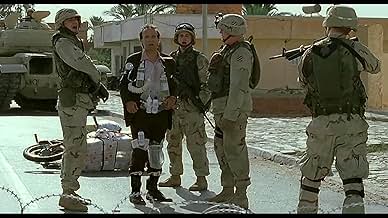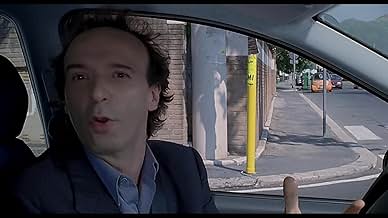PUNTUACIÓN EN IMDb
7,0/10
15 mil
TU PUNTUACIÓN
Un poeta italiano enamorado está atrapado en Irak al comienzo de una invasión estadounidense.Un poeta italiano enamorado está atrapado en Irak al comienzo de una invasión estadounidense.Un poeta italiano enamorado está atrapado en Irak al comienzo de una invasión estadounidense.
- Dirección
- Guión
- Reparto principal
- Premios
- 5 premios y 10 nominaciones en total
Reseñas destacadas
This film seems to be made for Roberto Benigni's fans. If you didn't like his previous films, don't bother with this one. The other comment that must be made is: this is not "Life is Beautiful". That film was simply wonderful, and I don't think it will ever find a match. Regardless this issue, "La tigre e la neve" is a very good movie. Benigni continues to show his amazing ability in order to mix comedy with drama, making the story very interesting and enjoyable. As a negative issue, we can point out that Benigni is a bit repetitive (it's his way of communicating), and might be a bit annoying for some people. The plot is quite simple: a man discovers that the woman he loves is seriously injured in a hospital in Baghdad, during American invasion in '03. He decides to travel to Iraq in order to help his loved one. The film has a good script, and is adequately seasoned with very good photography, music, and an unavoidable message of hope. Highly recommended for people looking for a story plenty of romanticism with a conceptually brilliant ending.
Roberto Benigni is such a likable guy. He's also one of the most talkative, if you've seen any of his films. Man, this guy rattles off sentences so fast it almost gives me a headache. It's doubly tough when you have to read a lot of subtitles in a hurry to keep up with him! It's also not easy when you're not quite sure what's going on, at least in the first third of the movie as scenes switch with a number of flashbacks. By the 25-minute mark of this movie, I was worn out to sort everything out and follow Benigni's rapid-fire speech. He also has a strange way - at least to us Americans - of expressing himself and his humor. He's definitely different.
No sense going into the rest of the story as other reviewers have capably done that. Overall, it was a nice story and it had some very touching moments. You have to root for Benigni's good-hearted character, "Attilio, "who certainly deserved a better wife than he got. His kids were super, nice girls. Also fun to watch and hear was Tom Waits, who plays the piano and sings throughout the film on-screen. One more thing: there was no preaching about the war in Iraq. The filmmakers were smart enough to let the viewer think for themselves.
No sense going into the rest of the story as other reviewers have capably done that. Overall, it was a nice story and it had some very touching moments. You have to root for Benigni's good-hearted character, "Attilio, "who certainly deserved a better wife than he got. His kids were super, nice girls. Also fun to watch and hear was Tom Waits, who plays the piano and sings throughout the film on-screen. One more thing: there was no preaching about the war in Iraq. The filmmakers were smart enough to let the viewer think for themselves.
I think the difference between the great and the normal artist lies in how they can re-produce the magic moments of art. The film "The life is beautiful" (TLIB) from Benigni was a nice surprise for me several years ago and now I thought let's see, what else he can do. To be absolutely honest this film is not as good, as the (TLIB), but I felt the magic once again. This film was not so deep, maybe, but it has something that I've never found in (american) comedies. There the source of the humor is often disgusting and it completely misses the real, intelligent humor, which can be found here. I definitely liked this film with all of errors and weaknesses in it. It's worth of watching.
Anyone who calls this film superficial, banal or trivial has spectacularly missed the point and is exactly the same type of person who was levelling precisely the same kind of criticism at La Vita è Bella. Now, though I do like Benigni (in my opinion La Vita è Bella is a masterpiece and films like Il Piccolo Diavolo, Johnny Stecchino and Il Mostro are exceedingly worthy comedies - that said I thought Pinocchio was an expensive disaster), I will try to be as objective as possible. In La Tigre e la Neve, Benigni repeats the masterfully delicate feat he accomplished in La Vita è Bella: he touches on complex, spikey issues (in La Vita è Bella it was the holocaust, here we have the war in Iraq) in a fable-like, simple manner - he doesn't politicise the film, and he doesn't delight in the gruesome (and very real) aspects of war. Yet this is NOT trivialisation of the subject matter. To believe that is to believe that the true horrors of war (or the holocaust) can only be conveyed on the screen by a documentary-style approach, and that cannot be the case. Benigni is far more effective - he does not shock the audience with visual representations of war, but his comedy in the face of war creates a subtle paradox that makes the whole film even more touching. La Tigre e La Neve is a fable about love, love in the face of adversity, stubborn optimism, hope and desperation and relationships between people of different races and creeds. Don't expect to see a Michael Moore rant at the injustice of war - Benigni is far more subtle. Perhaps the only criticism I have is that Nicoletta Braschi's performance is not always one hundred percent convincing, but Benigni and Reno more than make up for it. I truly hope it makes it on an international level - definitely a film to watch.
The Tiger and the Snow is a beautiful romantic movie, and it opened quite perfectly with an awesome ballad "You Can Never Hold Back Spring", performed by Tom Waits himself. Written and directed by Italian Roberto Benigni (famed for the wonderful LIfe is Beautiful), he also stars as the lead Attilio de Giovanni, a lovestruck poet who falls for a woman in his recurring dreams.
Only of course, to wake up each time he dreams of them at the alter, and when she is about to declare her undying love for him, punctuated with promises of hot sex. Yes, you read that right. But I digress. In reality, he's an absent minded poetry professor who always forgets where he parks his car. But despite his quirky looks and demeanor (are Benigni's characters always like that I wonder), imagine the pandemonium within him when he finally meets the woman in his dreams, Vittoria (the object of his obsession played by wife in real life Nicoletta Braschi), an acquaintance of fellow writer Fuad (Jean Reno).
Meeting in the dreams, and meeting for real can hardly be any different, and his infatuation with and love for Vittoria goes unrequited. Until of course we examine through to the rest of the movie, how unconditional and large this love for her is, when he takes it upon himself to journey to and through war-strife Iraq to save her from injury, through hell and high water, in dogged pursuit of elements that can save the love of his life.
Although infused with bits of comedy now and then, the movie takes a long hard look at how much one will do for someone else whom you love deeply. It might be a case of "nothing is impossible", given the will and the affection. But what if you know that what you're doing will likely to be unnoticed, or unappreciated, or unrequited. Then what? Hence the power of unconditional love. Truly very rare indeed. Should you feel, as the movie progresses, that certain bits seemed a little out of place, my advice is to persevere until the end, where a sleight of hand twist is introduced, and given the 20/20 hindsight, you'll begin to ponder, and understand this love a little more.
It's bittersweet, and with moments that might touch you. But alas, this is no Life is Beautiful, and although it has its moments with the beautiful make belief cinematographic elements in the end, it somehow lacked that extra bit of emotional depth to truly move an audience.
Oh, and that fellow blonde teacher, now she's hot!
Only of course, to wake up each time he dreams of them at the alter, and when she is about to declare her undying love for him, punctuated with promises of hot sex. Yes, you read that right. But I digress. In reality, he's an absent minded poetry professor who always forgets where he parks his car. But despite his quirky looks and demeanor (are Benigni's characters always like that I wonder), imagine the pandemonium within him when he finally meets the woman in his dreams, Vittoria (the object of his obsession played by wife in real life Nicoletta Braschi), an acquaintance of fellow writer Fuad (Jean Reno).
Meeting in the dreams, and meeting for real can hardly be any different, and his infatuation with and love for Vittoria goes unrequited. Until of course we examine through to the rest of the movie, how unconditional and large this love for her is, when he takes it upon himself to journey to and through war-strife Iraq to save her from injury, through hell and high water, in dogged pursuit of elements that can save the love of his life.
Although infused with bits of comedy now and then, the movie takes a long hard look at how much one will do for someone else whom you love deeply. It might be a case of "nothing is impossible", given the will and the affection. But what if you know that what you're doing will likely to be unnoticed, or unappreciated, or unrequited. Then what? Hence the power of unconditional love. Truly very rare indeed. Should you feel, as the movie progresses, that certain bits seemed a little out of place, my advice is to persevere until the end, where a sleight of hand twist is introduced, and given the 20/20 hindsight, you'll begin to ponder, and understand this love a little more.
It's bittersweet, and with moments that might touch you. But alas, this is no Life is Beautiful, and although it has its moments with the beautiful make belief cinematographic elements in the end, it somehow lacked that extra bit of emotional depth to truly move an audience.
Oh, and that fellow blonde teacher, now she's hot!
¿Sabías que...?
- CuriosidadesRoberto Benigni named his character "Attilio" as a tribute to poet Attilio Bertolucci (1911-2000) father of famous directors Giuseppe and Bernardo Bertolucci.
- PifiasWhen Attilio is stopped by US soldiers near Baghdad, a tall mountain range can be seen in the background, when there are no such mountains anywhere near Baghdad.
- Citas
Attilio de Giovanni: If she dies, they can close this whole show of a world... they can cart it off, unscrew the stars, roll up the sky and put it on a truck, they can turn off this sunlight I love so much. Do you know why I love it so much? Because I love her when the sun shines on her. They can take everything away, these carpets, columns, houses, sand, wind, frogs, ripe watermelons, hail, seven in the evening, May, June, July, basil, bees, the sea, courgettes...
- Versiones alternativasOn the North American home video release, the aspect ratio was cropped to 1.85:1.
- ConexionesFeatured in Tom Waits: The Acting Years (2019)
- Banda sonoraGranada
Performed by Claudio Villa
Selecciones populares
Inicia sesión para calificar y añadir a tu lista para recibir recomendaciones personalizadas
- How long is The Tiger and the Snow?Con tecnología de Alexa
Detalles
Taquilla
- Presupuesto
- 35.000.000 US$ (estimación)
- Recaudación en Estados Unidos y Canadá
- 10.167 US$
- Fin de semana de estreno en EE. UU. y Canadá
- 3701 US$
- 31 dic 2006
- Recaudación en todo el mundo
- 25.460.023 US$
- Duración1 hora 54 minutos
- Color
- Mezcla de sonido
- Relación de aspecto
- 2.35 : 1
Contribuir a esta página
Sugerir un cambio o añadir el contenido que falta

Principal laguna de datos
By what name was El tigre y la nieve (2005) officially released in Canada in English?
Responde
























